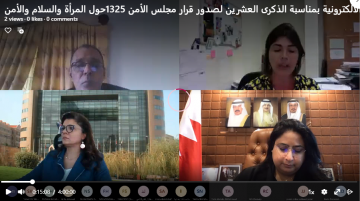
Beirut, 13 November 2020 (ESCWA)--The 20th anniversary of the adoption of United Nations Security Council resolution 1325 (2000) on women, peace and security comes at a time when the COVID-19 pandemic is wreaking havoc on countries’ economies and societies. Its impact is particularly hard on women, as the burdens they carry have multiplied and violence against them has increased dramatically. ESCWA joined international and regional entities in observing this milestone through several events.
On 4 November, ESCWA organized a virtual regional high-level meeting in partnership with UN Women, the League of Arab States and the Lebanese American University, during which government representatives discussed regional efforts in advancing the women, peace and security (WPS) agenda and the role of national action plans (NAPs) in responding to the COVID-19 pandemic.
"The pandemic has proven that the availability of NAPs enhances the capabilities of countries to respond to all crises, including those related to natural disasters or public health such as COVID-19," said the Leader of the Gender Justice, Population and Inclusive Development Cluster at ESCWA, Ms. Mehrinaz El Awady.
Also on 4 November, ESCWA joined a virtual dialogue organized by the Cairo International Center for Conflict Resolution, Peacekeeping and Peacebuilding (CCCPA) as part of ongoing efforts to develop Egypt’s first NAP on the implementation of Security Council resolution 1325 (2000).

On 26 October, ESCWA partnered with Tunisia’s Ministry of Women, Family, Children and the Elderly, UN Women and UNDP to celebrate this anniversary. During the conference held in Tunis to launch a week-long programme dedicated to the occasion, ESCWA, provided an overview of the Arab region’s engagement with the WPS Agenda and presented lessons learned from countries’ experiences.
Earlier, ESCWA had also marked this year’s anniversary in Kuwait through a webinar series in September and October during which participants agreed to formulate a NAP on WPS.
ESCWA also participated in events in other countries such as Iraq, Lebanon and the Sudan, bringing in international and regional expertise to improve engagement with the WPS agenda and its four pillars of prevention, protection, participation, and relief and recovery of women and girls in times of peace and war.
For more information:
- Ms. Rania Harb, Public Information Assistant, +961-70-008-879; email: harb1@un.org





